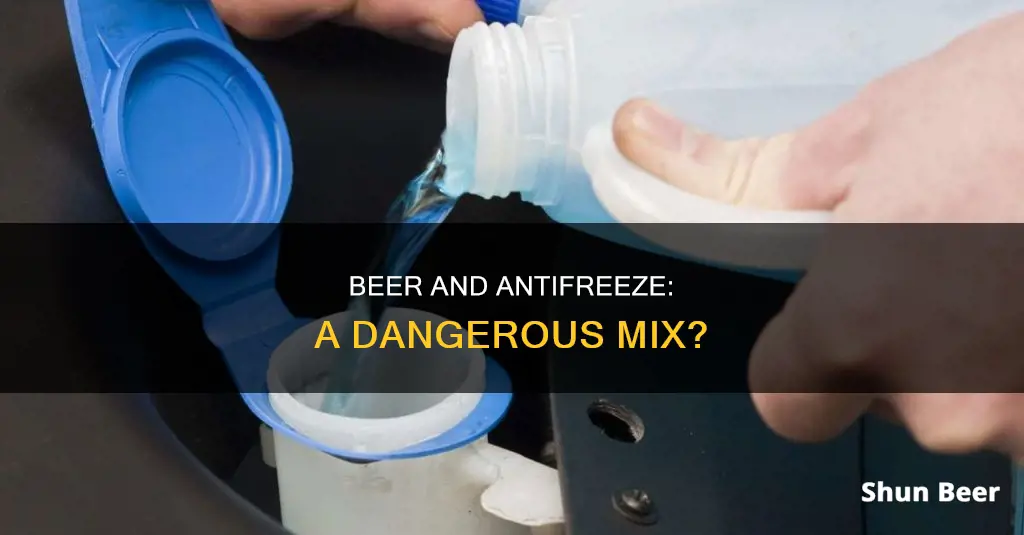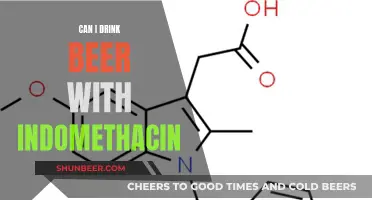
Ingesting antifreeze can be life-threatening and requires immediate medical attention. While the chemicals in antifreeze are relatively non-toxic, the body can quickly metabolize them into highly toxic byproducts, which can lead to organ failure and even death. As such, drinking beer or any other kind of alcohol after ingesting antifreeze is not recommended. In fact, alcohol is sometimes used as an antidote for antifreeze poisoning, as it can prevent the body from metabolizing the toxic chemicals in antifreeze. However, this treatment method should be administered by medical professionals, as attempting to self-medicate with alcohol can lead to more harm than good.
| Characteristics | Values |
|---|---|
| Should you drink beer if you ingest a little antifreeze? | No, drinking beer or liquor will not prevent antifreeze poisoning. However, ethanol (alcohol) is used as an antidote for antifreeze poisoning, but it is administered intravenously or with a needle. |
What You'll Learn

Beer won't cure antifreeze poisoning
Antifreeze is a water-based liquid commonly used to prevent a car's radiator from freezing or overheating. It contains liquid alcohols such as ethylene glycol, propylene glycol, and methanol, which are highly toxic if ingested. Ingesting even a small amount of antifreeze can cause life-threatening complications and organ damage within 24 to 72 hours.
While beer is an alcoholic drink, it will not cure antifreeze poisoning. The treatment for antifreeze poisoning involves the use of specific antidotes, such as fomepizole or ethanol, which are administered intravenously or through a nasogastric tube. These antidotes work by blocking the formation of toxic metabolites that lead to acidosis and kidney damage.
If you or someone you know has ingested antifreeze, it is crucial to seek immediate medical attention, even if you feel fine. Do not try to treat antifreeze poisoning with beer or any other alcoholic beverage, as it can cause more harm than good. The sooner you get professional help, the better the outcome.
Additionally, it is important to recognize the signs of antifreeze poisoning, which may include symptoms such as lack of coordination, excessive urination, excessive thirst, vomiting, and lethargy. These symptoms can progress to internal organ damage, elevated heart rate and breathing difficulties, and eventually, seizures, coma, and death.
In summary, beer is not an effective cure for antifreeze poisoning. If you suspect that you or someone else has ingested antifreeze, seek emergency medical care immediately.
Mixed Drinks vs Beer: Which is the Superior Beverage?
You may want to see also

Antifreeze is toxic to the body
Ethylene glycol is a water-soluble compound commonly found in household and car products. It is clear, odorless, and sweet-tasting but can irritate the eyes, skin, and airways upon contact. When ingested, ethylene glycol is rapidly metabolized into highly toxic byproducts, which can lead to complications such as kidney failure, permanent nerve damage, and even death. As little as two tablespoons can be fatal to a child, and four to sixteen tablespoons can kill an adult.
Propylene glycol, on the other hand, is generally considered non-toxic in small amounts and is even approved by the FDA for use in small quantities in some foods. However, at toxic levels, propylene glycol can cause seizures and severe neurological symptoms.
Methanol is a type of wood alcohol found in paint, varnish, and cleaners. Like ethylene glycol, it becomes highly toxic when ingested and metabolized, leading to toxic levels of formic acid in the body.
If you or someone you know has ingested antifreeze, it is crucial to seek immediate medical help, even if the amount ingested was small. The sooner you get help, the better the outcome. Call your local emergency number or poison control center for further instructions.
Beer and Thrush: Is There a Connection?
You may want to see also

Alcohol can be used as an antidote for antifreeze poisoning
Ingesting antifreeze can be life-threatening, and it is imperative to seek immediate medical attention if you suspect that you or someone else has consumed it. While beer and other alcoholic drinks are not antidotes to antifreeze poisoning, alcohol can be used as a treatment in certain situations.
Antifreeze is a liquid that contains ethylene glycol, propylene glycol, and methanol, which are harmful if ingested. Even a small amount can cause life-threatening complications and lead to organ damage, including kidney failure and brain damage. The early symptoms of antifreeze poisoning may include an inebriated feeling, lack of coordination, excessive thirst and urination, vomiting, and abdominal pain. These symptoms can appear gradually over several hours, and it is important to seek medical help even if you are unsure whether you have ingested antifreeze.
While beer is not an antidote for antifreeze poisoning, alcohol (ethanol) has been used as part of the treatment for ethylene glycol poisoning in a hospital setting. Ethanol is the type of alcohol found in alcoholic drinks, and it can be administered intravenously or orally in the form of strong spirits like vodka or gin. However, self-treatment by drinking alcohol is not recommended and can be dangerous.
The preferred antidote for ethylene glycol poisoning is a medication called fomepizole (Antizol), which is an alcohol dehydrogenase inhibitor. It is easy to measure and does not cause central nervous system depression or low blood sugar like alcohol can. Fomepizole is the only antidote approved by the U.S. Food and Drug Administration for this purpose. In cases where fomepizole is not available, ethanol can be used as an alternative.
It is important to note that the treatment for antifreeze poisoning should be started as soon as possible after ingestion to be effective. The earlier the treatment begins, the greater the chances of survival and recovery. Therefore, seeking immediate medical attention is crucial if you suspect antifreeze ingestion.
Parks and Rec: Beer-Drinking and Hilarious Antics
You may want to see also

Antifreeze poisoning can be fatal
Antifreeze poisoning can indeed be fatal. It only takes a small amount of antifreeze to poison the body and cause life-threatening complications. The fatal consequences of antifreeze poisoning can occur within 24 to 36 hours of ingestion.
Antifreeze contains chemicals such as ethylene glycol, methanol, and propylene glycol, which are rapidly metabolized into highly toxic byproducts by the body. While propylene glycol is generally considered non-toxic in small amounts, ethylene glycol and methanol are hazardous and poisonous if ingested.
The effects of antifreeze poisoning can be gradual, with symptoms developing over several hours. Early symptoms may include an inebriated feeling, lack of coordination, slurred or jumbled speech, and shallow or slow breathing. As the poisoning progresses, it can interfere with kidney, lung, brain, and nervous system function, leading to organ damage within 24 to 72 hours.
If left untreated, antifreeze poisoning can result in severe complications such as hypocalcemia, encephalitis, pulmonary edema, kidney failure, permanent nerve damage, and even death. Therefore, it is crucial to seek immediate medical attention if antifreeze ingestion is suspected, even if symptoms are not apparent.
Beer Consumption After Gastric Lap Band Surgery
You may want to see also

Symptoms of antifreeze poisoning are similar to alcohol intoxication
Antifreeze poisoning can have symptoms similar to alcohol intoxication, but it is important to note that ingesting even a small amount of antifreeze can be toxic and life-threatening. It can lead to permanent organ damage and other serious health complications. Therefore, immediate medical attention is crucial, even if symptoms are not apparent.
The symptoms of antifreeze poisoning may take time to develop and can be similar to those of alcohol intoxication. Early signs may include an inebriated feeling, lack of coordination, slurred speech, and dizziness. These symptoms typically appear within 30 minutes to 12 hours after ingestion.
As antifreeze is further metabolised by the body, it can cause severe internal damage, particularly to the kidneys, brain, lungs, and liver. This second stage of poisoning usually occurs 12 to 36 hours after ingestion and can lead to an elevated heart rate, dehydration, high blood pressure, metabolic acidosis, and irregular heartbeat.
The third stage of antifreeze poisoning, which occurs 24 to 72 hours after ingestion, is characterised by kidney failure and the development of calcium oxalate crystals in the kidneys. This stage can be life-threatening and requires immediate medical intervention.
It is important to note that the effects of drinking antifreeze can be confused with alcohol intoxication, but the consequences of antifreeze poisoning are much more severe and can lead to permanent organ damage or even death. Therefore, it is crucial to seek immediate medical attention if you or someone you know has ingested antifreeze, even if the amount ingested was small.
Beer and Acne: Is There a Connection?
You may want to see also
Frequently asked questions
Antifreeze is a liquid that prevents a car's radiator from freezing or overheating. It is also known as engine coolant.
Antifreeze contains chemicals that are toxic if ingested and can cause life-threatening complications. It only takes a small amount to poison the human body.
Get immediate medical help. Call 911 or your local emergency number.
No, you should not drink beer or any other alcoholic beverage to cure antifreeze poisoning. While ethanol (alcohol) can be used as an antidote for antifreeze poisoning, it should be administered intravenously or with a needle. Self-administering alcohol can be dangerous as it can lead to further harm.







